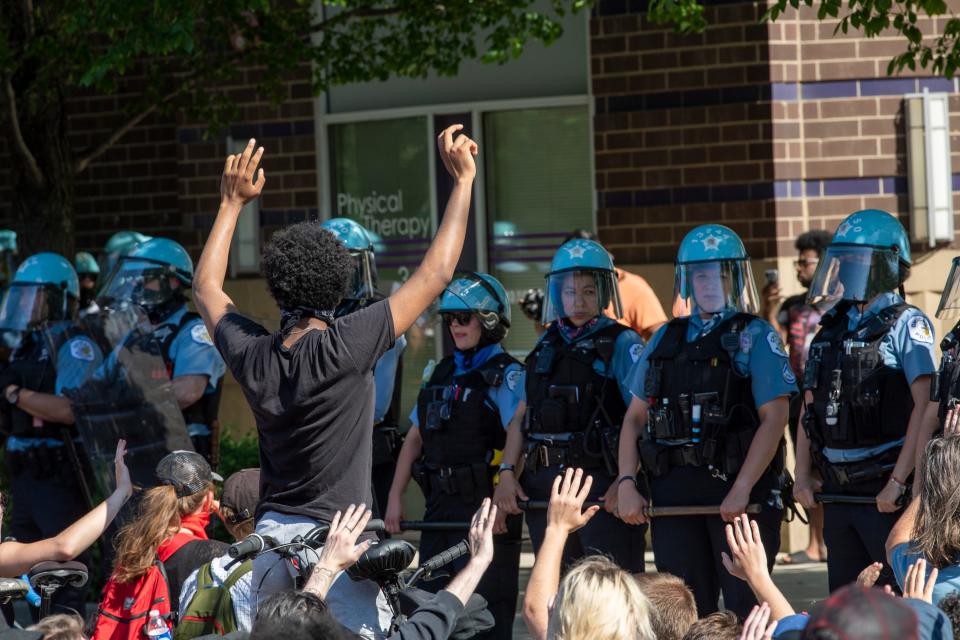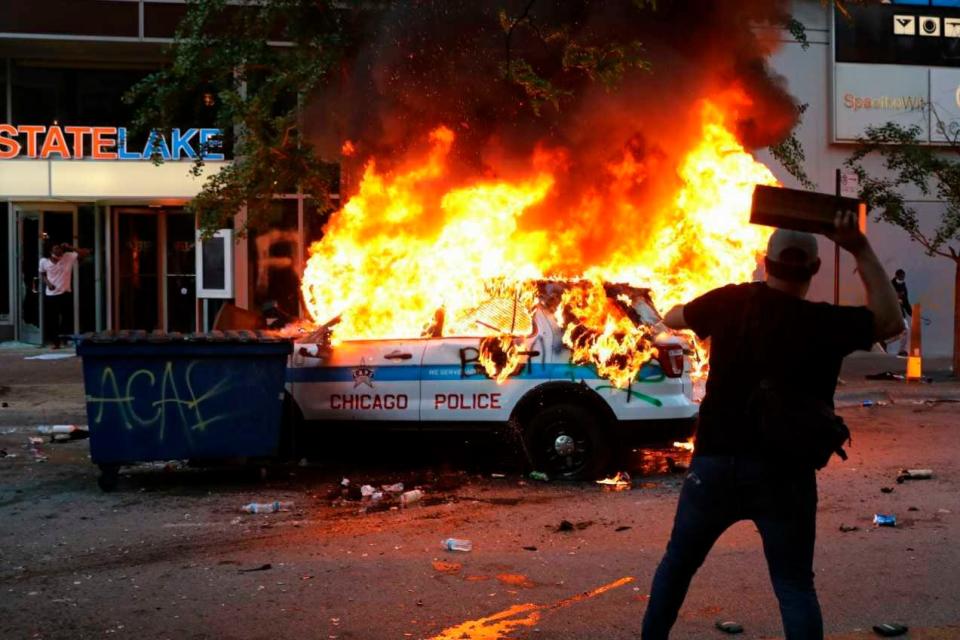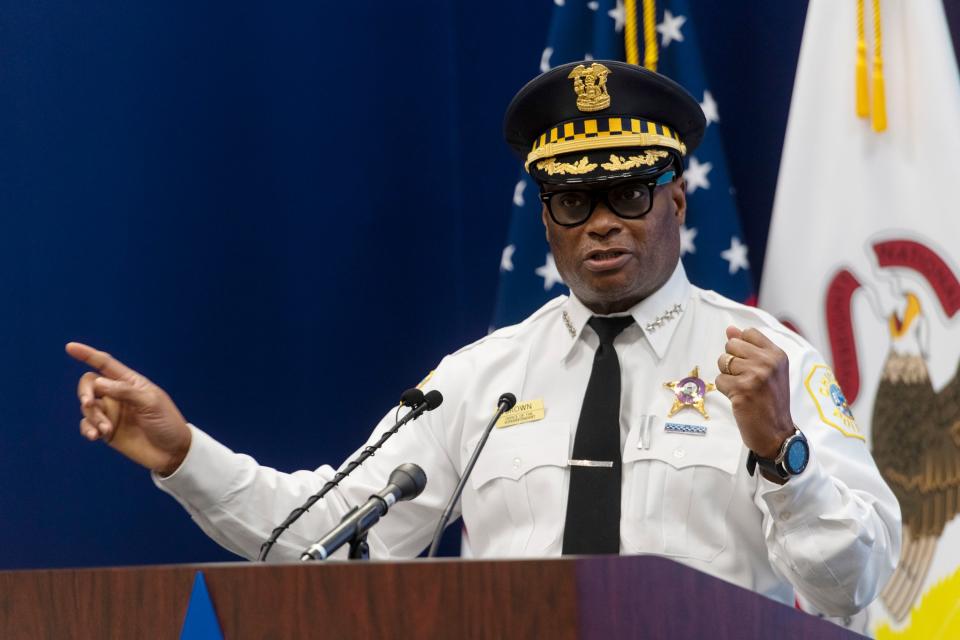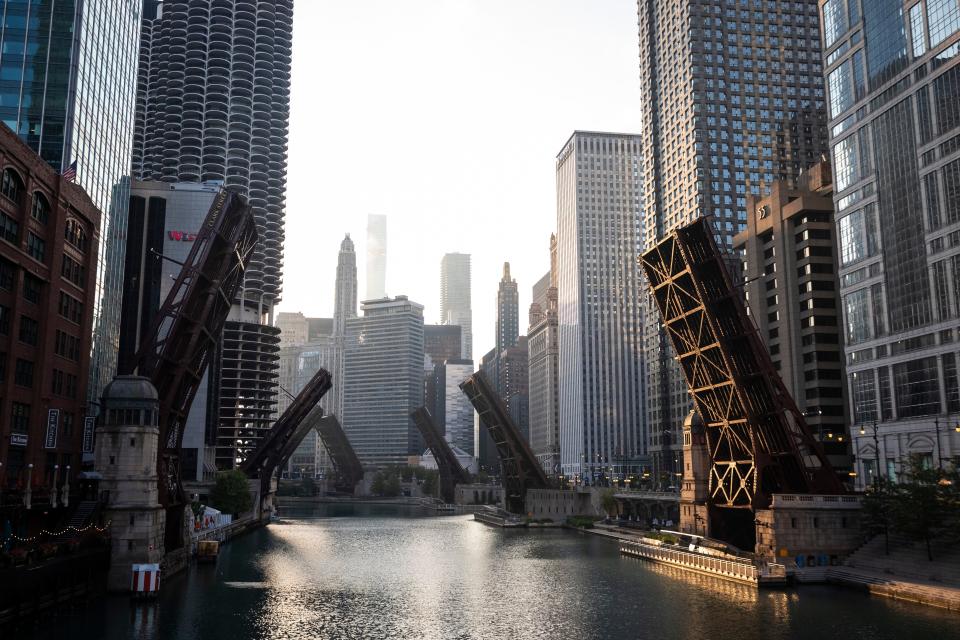Scathing watchdog report finds Chicago police was 'ill-equipped' to handle summer protests, unrest
- Oops!Something went wrong.Please try again later.
CHICAGO – A scathing report from the city's watchdog agency Thursday found the Chicago Police Department was "under-prepared and ill-equipped" to respond to mass protests and unrest last summer following the police killing of George Floyd.
Some Chicago police officers failed to report uses of force, did not wear body cameras, or covered up their badge numbers and nameplates, the lengthy report by the Office of the Inspector General found.
The department – namely senior leadership – "critically disserved both its own front-line members and members of the public," the report found. Officers "were at times left to high-stakes improvisation without adequate support or guidance."
Floyd, a Black man in handcuffs, was killed May 25 after a white police officer pressed his knee against Floyd’s neck for more than eight minutes as Floyd said he couldn’t breathe. Protests and unrest broke out in Minneapolis and, days later, in Chicago and around the country.
Police don't all act 'the same way': White officers use force more often, Chicago police study finds
George Floyd trial: Judge denies request to use 16 past incidents as evidence against for officers

The report from the Office of the Inspector General analyzed the events of May 29 through June 7. Investigators reviewed thousands of documents and conducted more than 70 interviews.
"While the challenges were daunting, and in some respects unprecedented in recent memory, the efforts of CPD and the City to stem unrest were marked, almost without exception, by confusion and lack of coordination in the field," the report found.
The department "lacks an authoritative record of uses of force" from the time because the department "did not fulfill its force-reporting obligations and did not provide clear and consistent guidance to officers on reporting obligations," the report found. The department "failed to appropriately document" uses of force and "underreported uses of baton strikes and manual strikes."
The department was also "unprepared" to make mass arrests and had not trained its members on mass arrest procedures "in years." From May 29 through June 7, the department made 1,500 arrests. Approximately 1,000 of those arrests were on May 30 and 31.
That weekend, hundreds of protesters gathered downtown for a rally and march. As night fell, the city witnessed the first of two periods of looting. People broke into stores, set fires and vandalized buildings. The mayor announced a citywide curfew, suspended transit to downtown and raised several of the city's bridges. The governor deployed the Illinois National Guard.
More: Chicago police accused in federal lawsuit of brutal attacks on protesters

The report says that the lack of mass arrest preparation led to "frequently inadequate" documentation of arrests, leading to arrestees released without charges and undercharging. Transportation and processing of arrestees also took "too long," leading to officer and arrestee safety concerns.
In a letter responding to the report, Police Superintendent David Brown criticized the watchdog agency for scrutinizing the response of his department, rather than the response of "all" city agencies. Brown noted that the period in question was "incredibly difficult" for Chicago and the nation, with law enforcement challenges "compounded" by the COVID-19 outbreak.
"Many (officers) worked long hours without days off due to the staffing shortages and despite what was asked of them, many served without issue," Brown wrote. "The Repot focuses on the shortcomings of the Department, but is is just as important to acknowledge the success of the department as well."
Brown noted that the department also conducted its own self-review after the protests and unrest.
Protesters clash with police: Violent encounter at Chicago's Columbus statue; 12 arrested, many injured
Do Lincoln, Washington deserve statues?: Chicago flags 41 controversial monuments for scrutiny

Protests and unrest continued in Chicago throughout the summer and early fall, but the report analyzed events up to June 7.
The investigation found "widespread non-compliance" with the department's policy requiring the use of body-worn cameras, often because officers were working outside regular shifts and were deployed directly to the field, rather than from their stations. "Countless interactions" between police and civilians were not captured on the cameras, the report found.
Investigators documented "widespread" complaints and evidence of officers obscuring their badge numbers and nameplates while deployed during the protests and unrest.
"These actions, coupled with CPD’s failure to keep comprehensive records to show who was deployed where and when, profoundly compromised the investigation of allegations of misconduct – beginning with the identification of accused members," the report said.

Separately, a federal lawsuit filed in November alleges that officers used "brutal, violent and unconstitutional tactics" to quell protests, with victims claiming they were beaten with batons and sprayed with chemicals. Officers targeted protesters' property, "regularly called protesters vile and vulgar names" and "often affirmatively escalated encounters through taunts, shoves, pushes, and other inappropriate behavior at these protests," the suit said.
The Office of the Inspector General warned that the police department's "shortcomings" last summer will have long-lasting repercussions for Chicago.
"Missing reports and videos may limit or preclude prosecution of some arrestees as well as accountability for individual officers and may compromise CPD and the City’s position in investigations or litigation," the office wrote.
The report comes days after a groundbreaking research paper found white Chicago police officers make more stops, more arrests and use force more often than Black and Hispanic officers facing similar situations, especially when interacting with Black people.
This article originally appeared on USA TODAY: Chicago cops didn't adequately report use of force this summer: Report

